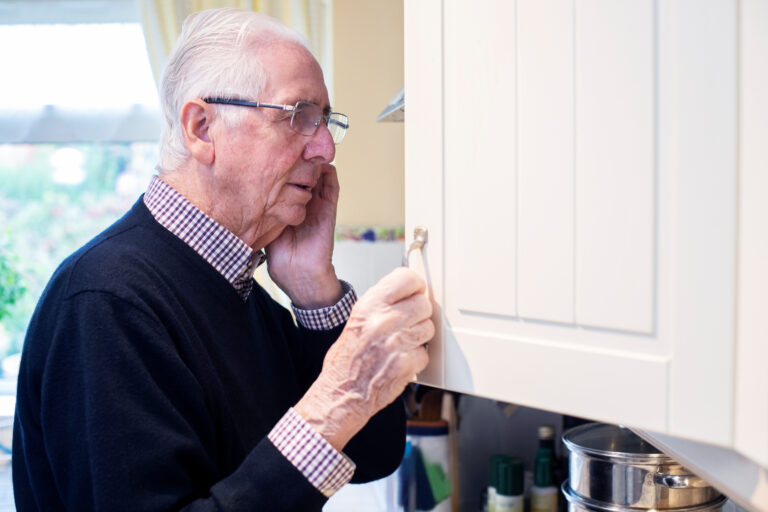If your loved one has a terminal illness and your family is considering hospice care, you may be trying to decide on the best place to receive this care. This is a very personal decision for every family, and whether you choose hospice care at home or in a hospice facility, there’s plenty to consider.
To help you make the decision, this article will cover what to expect from hospice care at home, as well as the details on who’s eligible for hospice care, the different members of a hospice care team, and how this type of care can help your whole family.
Are you or a loved one living with a chronic or terminal illness?
The Sage Family of Companies is here to help.
Are you or a loved one living with achronic or terminal illness?
The Sage Family of Companies is here to help.
What Is Hospice Care at Home?
Hospice care is a specialized type of healthcare that aims to enhance the comfort and quality of life for patients with a terminal illness who are approaching their final days. You may choose to receive hospice care at home or at a healthcare facility, such as a nursing home or hospice center.
When you enroll in hospice care, your doctors stop treatments intended to cure your disease. The goal of this care transitions to easing pain and other symptoms as you prepare for the end of life.
What to Expect From Hospice Care at Home
Hospice care provides comprehensive care to address your loved one’s physical, mental, emotional, and even spiritual needs during the difficult time at the end of their life. When receiving hospice care at home, members of your loved one’s care team will come straight to your home to deliver care.
So, what are the advantages of receiving hospice care at home? Below is an outline of what you can expect.
Medical Equipment
You and your loved one will receive medical equipment such as wheelchairs, bandages, and walkers. These items will help ensure your home is appropriately set up to make the experience as comfortable as possible.
Medical Care and Symptom Management
Home hospice care focuses on providing comfort and improving your loved one’s quality of life as the end of their life approaches. While curative treatments are stopped at this time, your loved one will still receive medical care to ease their pain and other symptoms.
This may include medications, physical or occupational therapy, dietary guidance, and speech-language pathology services.
Emotional and Spiritual Support
Preparing for the end of life can be an extremely difficult time. It’s normal to have conflicting feelings and strong emotions as you ready yourself to transition out of life. Your hospice care team can provide counseling to help your loved one cope with their mental and emotional health during this challenging time.
If religion or spirituality play a role in your loved one’s life, chaplains or other faith leaders can be made available to discuss their needs.
Caregiving Assistance
Members of your hospice care team, including home health aids, can assist with everyday caregiving tasks, including bathing, dressing, grooming, preparing meals, and eating. They can also help with various aspects of medical care, such as medication management and changing wound dressings.
Support for Family Members
A terminal illness has a major impact on the entire family. Just as loved ones play an important role in caregiving, they’re also a big part of hospice care.
Resources available to family members include:
- Caregiving support
- Respite care (short breaks from caregiving to prevent burnout)
- Bereavement counseling
- Access to support groups
Comfort
Your loved one will remain comfortable in their own familiar space with their own belongings, which can bring a sense of calm and peace during this difficult time.
Convenience
Members of your hospice care team will come to your home when it’s convenient for your family’s schedule to deliver care. You can also set your own visiting times with friends and relatives who wish to spend time with your loved one as the end of their life approaches.

Who Is Eligible for Hospice Care at Home?
Generally, your loved one will be eligible for hospice when their doctor estimates that they have six months or less to live, if their illness takes its natural course.
Anyone with a terminal illness can receive hospice service. While the list below isn’t exhaustive, some of the diseases most commonly treated in hospice care include:
- Cancer
- Alzheimer’s disease and Dementia
- Heart Disease
- Lung disease
- Chronic Obstructive Pulmonary Disease (COPD)
- Kidney disease
- Amyotrophic Lateral Sclerosis (ALS)
Who Is on Your Hospice Home Care Team?
Your hospice care team will consist of specially trained healthcare professionals who will provide medical, physical, emotional, mental, and spiritual care for your loved one at the end of life.
Members of your hospice may include:
- Doctors
- Nurses
- Specialists
- Home health aids
- Social workers
- Counselors
- Dietitians
- Physical or occupational therapists
- Speech language pathologists
- Spiritual or faith leaders
- Volunteers
How to Prepare for Hospice Care at Home
You may need to make some adjustments to your home to make it suitable for hospice care.
- Mobility: Since your loved one’s mobility will likely be limited, you’ll need to ensure easy access to a bathroom and a safe way to leave your home.
- Accessibility: You should also remove tripping hazards, such as extension cords, small rugs, and clutter from all hallways and walking paths. Bed rails, grab bars in the bathroom, a sturdy shower chair, and anti-scald devices on faucets are also useful to prevent falls and accidents.
Why You Shouldn’t Call 911 During Hospice Care at Home
It’s important to remember that you should never call 911 or take your loved one to the emergency room while they’re in hospice care. This may be counter-intuitive, especially if your loved one is in distress, but your first call should be to your hospice care team.
If the hospice team is unable to stabilize your loved one, then they can authorize an ER visit or hospitalization. If you don’t follow this plan, the patient will be dismissed from hospice care and readmitted when they return. Without prior approval, patients and their families will be fully responsible for all costs relating to the hospital stay, including ER and hospital fees, diagnostic tests, medications, and ambulance charges.

When It’s Time to Consider Hospice Care
Typically, your loved one’s doctor will recommend hospice care when they believe your loved one has six months or less to live. This usually occurs when treatments meant to stop or cure the disease are no longer working. Sometimes, patients wish to stop curative treatments and start hospice care because the side effects from the medications are too great and are severely diminishing their quality of life.
If your loved one is experiencing the following, these are the signs it may be time to consider hospice include:
- Recurrent infections
- Loss of appetite
- Inability to complete routine tasks on their own
- Confusion
- Inability to communicate
- More frequent trips to the ER and hospital admissions
Home Hospice Care FAQ
Here are answers to some of the most frequently asked questions about hospice care at home.
How Long Do People Last in Hospice Care at Home?
Generally, people with a terminal illnesses start hospice care when they have six months or less to live. According to research, about 94 percent of hospice patients die within those six months.
What’s the Difference Between Hospice Care and Palliative Care?
While hospice and palliative care often get confused, they aren’t the same. Hospice care is end-of-life care, where treatments meant to cure the disease are stopped. Palliative care is a specialized type of care for people with a chronic illness who are still receiving curative treatment.
Hospice care focuses on comfort as the final days of life approach. Your loved one will still receive medication to control their pain and other symptoms.
With palliative care, your loved one will receive curative treatment, along with treatments to enhance their quality of life, and their physical, mental, emotional, social, and spiritual health.
Anyone can begin palliative care at any age and any stage of a disease, but hospice care is reserved for people whose doctor has determined that they have six months or less to live.
Summary
The end of life is an extremely difficult and emotional time for the whole family. Hospice care at home can help bring comfort to your loved one as they prepare to transition out of life, and provide resources to help your family cope.
The Sage Family of Companies is here to answer any questions you may have.
References
- Hospice Care, NIH, 2023
- Hospice, Cleveland Clinic, 2023
- Can Hospices Predict which Patients Will Die within Six Months?, NIH, 2014






